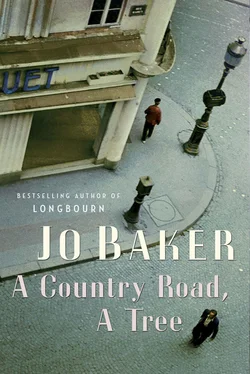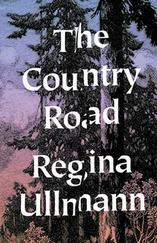She nods.
Her face, though, is white and running with water, and her eyes close in a slow blink. She would be safe, if it were not for him; she would at least be safer; she would be holed up in the countryside with her mother. She would be staying with a friend. Even now she could be tucked up in a reception centre. There’s nothing wrong with her papers.
“Come on,” he says. He hauls her upright. “There’ll be something round the next corner…” Even if it is just slick pavements, bolted doors.
They carry on. It’s getting dark; the rain continues. They are in narrower, winding streets, which circle in upon themselves, repeating and changing like a melody, at once familiar and different. A thin wind throws the rain right into their faces; their eyes sting. The church looms above them. The street curves away in both directions, a commercial street with all the commerce done and everything locked up and shuttered for the night. Have they been this way before? Are they walking round in circles? Would it even matter if they were, since there is nowhere to go but on? Then Suzanne pulls away from him and stumbles off across the wet cobblestones.
“What—?” he follows her.
She sinks down on a public bench.
And now they’ve stopped. Somewhere a clock chimes ten. He stands beside her, puts a hand on her shoulder. The wool is cold and wet. She leans against him like a dog, eyes shutting, half asleep although still upright. His eyes could close too, and then the sting would be less, of water, and the salt that water picks up off the skin. But he doesn’t trust himself to close his eyes.
“We can’t stop here,” he says.
She nods, her cheek grazing up and down against the cloth of his coat.
“You have to get up. Suzanne. Listen. We have to move on.”
She turns her face up to him, opens her eyes. Her skin is bone-white; her eyes are black.
“Where’ll we go?” she asks.
He blinks and looks away. He wipes his face.
“I don’t know,” he says, “but we have to.” And music winds through and out of the tumbling rain, and his head is filled with the brilliant hallucination of song.
Vom Abendrot zum Morgenlicht
Ward mancher Kopf zum Greise
Wer glaubt’s? Und meiner ward es nicht
Auf dieser ganzen Reise!
His head feels full and overflowing. It seethes with music and fatigue. Her body leans heavy against his; he feels it through him when she shivers. It is deep and hard, a palsy through her bones.
Terror has wormed its way into his. He wipes his face and the wet is cold with rain and warm with tears. There is another voice now in his head. It cuts through the music, the night and the rain, through everything with its sharp incision:
What possible use do you imagine you would be?
“Come on,” he says to Suzanne.
She slowly shakes her head.
“Come on,” he says, and reaches for her arm.
Suzanne mumbles and softly resists his pull. “I feel quite warm now.”
“No,” he says. “You can’t do that.”
He leans down and wraps his arms around her; he lugs her to her feet. For a moment they sway together. Exhaustion has made them ridiculous: they could be toppled with a push. Soaking, they cling to each other, all legs and arms, like a creature of the moon.
Then they are spotlit. The green fleck in her coat, the cold pink of her throat. He leans away to look at her and she blinks like a baby at him, confused.
Who’s watching them?
He scans round. On the far side of the street, above a shop, a window is illuminated. Then a figure looms up against the pane and draws down the blind. Blackout now. They’re back in darkness. It turns out nobody’s watching them. Nobody’s interested in them at all.
“Come on.”
He shifts his grip round her and half carries her across the street, to an unknown door.
—
They eat, huddled in the upstairs room in front of a low fire. Suzanne’s cheeks are hot, and from time to time a deep shiver runs through her. She is capable of nothing beyond the necessities of courtesy. If her eye is caught, she smiles. It’s the best that she can do. She is not yet herself, but at least she has the chance now to become herself again.
The window is misted; it runs with drips. They have been found two rush-seated chairs and given cushions. There is a liquorice liqueur in chipped coffee cups that they both sip at compulsively. There is perfect bread and perfect ham. These are extraordinary comforts.
They wear stale-smelling, borrowed sweaters. Their coats steam over chair backs, their shoes are stuffed with newspaper, their socks and stockings hang above the fireplace to dry.
The lady of the house, who is the keeper, too, of the shop below, asks about what’s going on in the north. Paris has fallen, she heard that from the radio, but you can’t be certain of what you are told, not the radio, not the newspapers, not any more. They keep telling everybody to stay calm, but why should we be calm? Things must be very bad indeed if people will up and leave their lives behind just like that.
“We don’t know any more than you,” he says. “We left before the Germans got there.”
She widens her eyes, considers this. “I suppose you’d have had to,” she says, “or you couldn’t have left at all.”
There is no space for them in the flat, the family is already packed in like cigars in a box. They will have to sleep downstairs in the shop. They can borrow blankets.
He watches Suzanne down the narrow stairs; he carries the bundle of bedding. She is doing what she’s told without demur, she’s uncertain of her footing. She holds tight to the handrail, like an old woman. He is still worried about her.
The shop below sells religious paraphernalia. It is populated with plaster saints. Christ hangs, his ivory flesh crucified over and over again, all around the walls. Sacred hearts flicker in the light of their little candle. This is the deus ex machina by which they have been saved.
They huddle down behind the counter, backs to the panelling, the counter-top a narrow ceiling above them. The little shop is riddled with draughts. He fumbles a borrowed blanket over her shoulders, draws the other up over his knees. They sit shivering side by side. There’s a steady drip from the blocked guttering and the tumbling rush of water down the street outside. He huffs out the candle and the saints blink out of sight. In the darkness, she huddles closer, her face pressed into the covers. Her voice comes muffled through the blanket.
“It smells of feet.”
“Want me to turn it round?”
She shakes her head.
After a while, she says, “I’m so cold.”
He fumbles his blanket loose and lays it over her knees too. Stiff, she pulls her blanket out in a wing and slides it behind his shoulder, draping it round him.
“Well,” he says. “This is not so bad.”
She tuts.
“You’ll be missing your lovely bench, then, and the rain?”
He can just about make her out in the light from the street: her white face, beautiful and alien as those plaster saints. He should never have burdened her with him; he should never have let her make herself a part of what he did. Her head sinks down to rest on her knees.
“You see, you’ve got these great long legs,” she mumbles. “And mine are only short.”
The warmth gathers between them; their outer edges are still cold. Blinks slow; breath softens. Now and then there is a shiver. In the hallucinatory slip towards sleep, it seems to him that the statues swell and shrink with breath. Blood wells from wounds and drips, drips, drips. And below, on the bare floorboards, human bodies share the almost nothing that they have, and go on living.
Читать дальше










